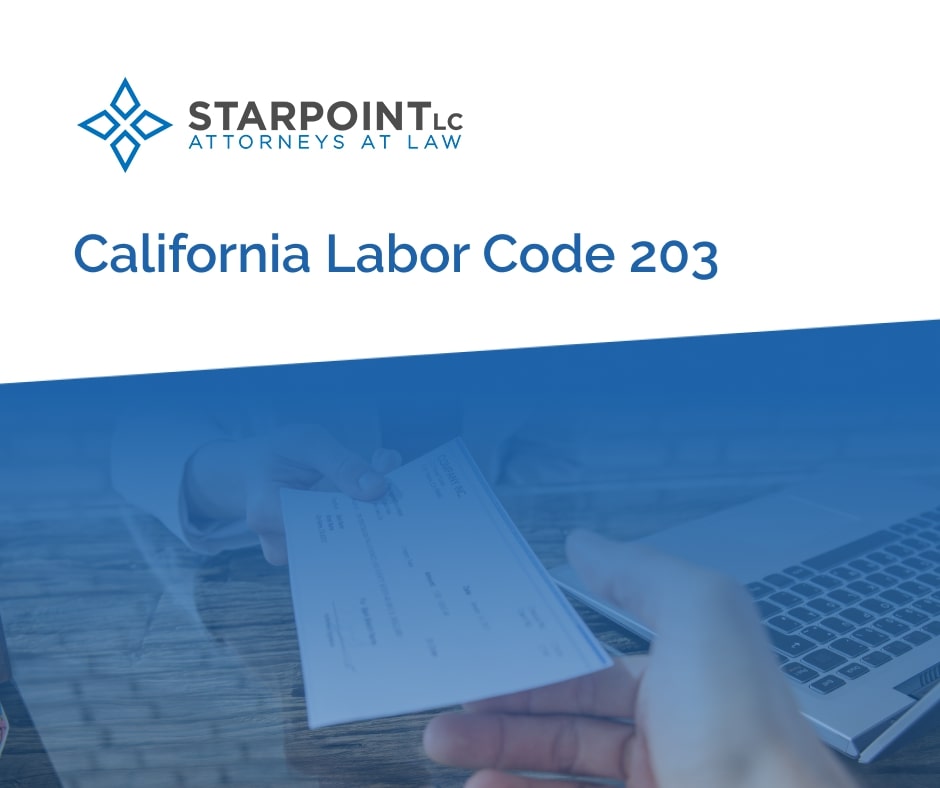Penalty for Late Final Paychecks – CA Labor Code § 203

Whether you are a new employee, an established employee, or an employee on their way out the door, your employer must pay you on time.
And California Labor Code section 203 penalizes employers if they do not timely pay employees who are fired or quit.
If you are waiting on final payment after leaving your job, talk to us about recovering your wages and section 203 penalties from your former boss.
At Starpoint Employment Law, our experienced employment attorneys have recovered significant settlements for mistreated employees across California.
And we are ready to give you the client-focused, aggressive representation necessary for enforcing your rights against employer misconduct.
What Does California Law Say About My Right to a Final Paycheck?
You must receive your final paycheck quickly. But how quickly your employer has to pay you depends on the circumstances of your departure.
Some Departing Employees Are Entitled to Immediate Payment
If your employer terminates you, you must receive your final paycheck immediately, meaning you have to receive your final wages at the time of your termination.
And if you give your boss at least 72 hours’ notice that you are quitting, your employer is obligated to provide you with your final paycheck at the time you leave.
Discharged employees should receive immediate payment at the location where they were discharged.
And an employee who quits after giving sufficient notice should receive their immediate payment at the employer’s agency or office that is located in the county where the employee worked.
Some Departing Employees Are Entitled to Payment Within 72 Hours
An employee who does not give 72 hours’ notice of their intention to quit is entitled to receive their last paycheck within 72 hours of their last workday.
If you quit without three days’ notice, you can request that your employer send your paycheck to the mailing address you designate.
What Should My Final Paycheck Include?
Your final paycheck should include all wages you earned up to the point of separation, including any earned and unused vacation pay.
The law does not always require an employer to include vacation pay in an employee’s final paycheck, but an employer must remit payment for any unused vacation pay that the employee earned according to the employer’s policies.
What Are Section 203 Penalties?
Under Labor Code section 203 in California, you can take an employer to task for refusing to deliver your last paycheck on time.
If your employer willfully fails to pay you within the applicable timeframe discussed above, your employer must pay your daily wage rate for every day your payment is late.
California law caps this penalty after 30 days of delay. However, your employer is not liable for penalties if the delay is caused by your evasion of your employer’s attempts to make its final payments to you.
Does My Employer Have to Pay Me If It Disputes the Amount of My Final Paycheck?
If your employer disputes the amount of your final wages, it does have a limited right to withhold final pay. However, your employer can withhold only the amount in dispute.
For instance, if your boss believes that you earned $750 for your last pay period, and you believe that you earned $1000, your employer can withhold only $250 from you while trying to resolve the dispute.
Also, this right to withhold applies only to employers that have a good-faith belief that their employees are owed less than what they claim.
I Have Not Received My Last Paycheck. What Can I Do?
You can seek your final wages and penalties from your employer by filing a lawsuit in court or a wage claim with the California Labor Commissioner’s Office.
After you initiate a lawsuit or an administrative complaint, you might be able to settle your claim, or you might have to take your complaint to trial to receive a resolution.
To effectively navigate your claim, you should start gathering evidence right away. Helpful evidence in a wage claim can include the following:
- Pay stubs,
- Letters of resignation,
- Work schedules,
- Employer policies (including vacation policies),
- Personnel records,
- Employer correspondence, and
- Employment agreements.
You want to be able to prove the amount of notice you gave before your departure, the daily wages that should be applied to your case, the lack of dispute over the amount of your final paycheck, and the information your employer had for delivering its final payment to you.
However you choose to adjudicate your complaint, you must make sure to timely file your legal action. You have three years to take legal action against an employer that fails to pay you on time.
One of our knowledgeable wage and hour attorneys can meet your claim deadlines and make the best arguments in your favor. We can also maximize your recovery in a wage complaint.

Call or Contact the Lawyers at Starpoint Employment Law Today
Making sure you receive everything your former employer owes you is crucial.
No matter how you have left a business, agency, or organization, you deserve the fruits of your labor. And at Starpoint Employment Law, we can make sure your employer respects your rights and pays for its misconduct.
Not only are we aggressive advocates for individuals working in the State of California, but we also have a perfect track record. We have not lost a case.
We keep the lines of communication open with our clients so that no one is left in the dark about their options and how we plan to recover compensation and relief on their behalf.
If you have been mistreated by your employer, we are ready to listen to your story and jump into the ring on your behalf. You can reach out to us online or call us at 310-935-3612 to schedule a free consultation.

